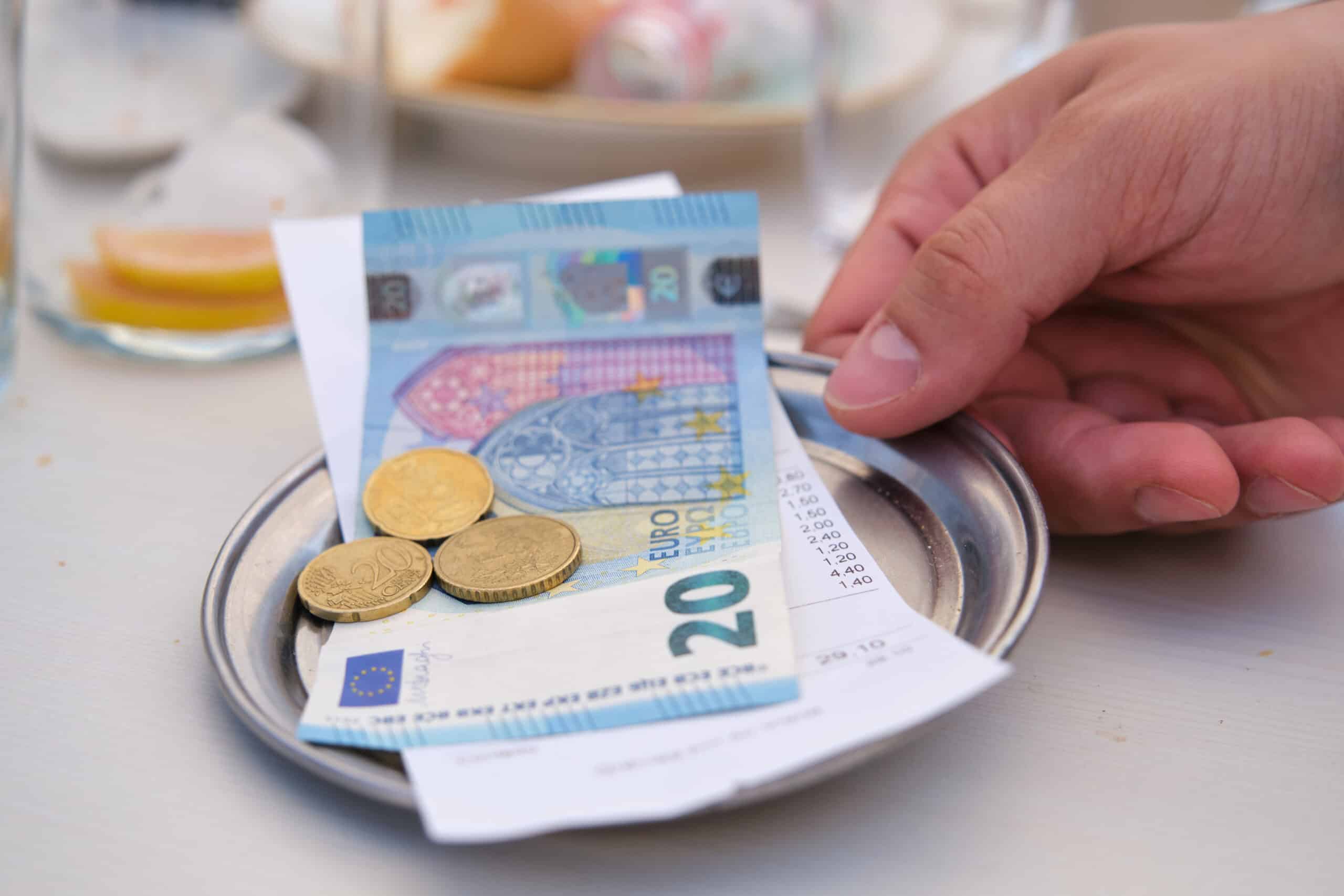

Unsure about whether you should tip or not when dining out or using various services in Ireland?
Understanding gratuity practices can be confusing, especially when mandatory service charges are involved. In this article we unravel the complexities surrounding tipping in Ireland and discover whether gratuity is mandatory, employees rights to tips and business owners responsibility regarding tips.
In Ireland, people often mix up gratuities (tips) with mandatory service charges. But there are clear differences: tips or gratuities are voluntary and are for the employees’ benefit, while mandatory service charges are fees customers have to pay for the services they’ve used.
Understanding the dynamics of tipping and service charges is essential for both customers and businesses.

The Payment of Wages (Amendment) (Tips and Gratuities) Act 2022 introduces specific rules regarding the distribution and transparency of tips and service charges.
A “mandatory service charge” is a payment that customers are required to pay. It’s in addition to the cost of specific goods or services.
A “tip or gratuity” is a payment that customers choose to give directly to an employee or group of employees. They expect or assume that the payment will be kept by the employee or shared among them.
Unlike some countries, in Ireland, tipping is discretionary. It rests upon your satisfaction with the service provided. A typical tip is around 10-15% of the bill, reflecting how you perceive the quality and attentiveness of service.
Here’s what you can generally expect:
In Irish restaurants, a ‘tip or gratuity’ is often seen as a token of appreciation to the staff for their table service. It tends to be voluntary and left at your discretion. For insight on recent legislation, peek at Tips, gratuities and service charges – Citizens Information.
Some establishments may include a mandatory service charge as explained above, notably in groups. If you’re unsure, it’s perfectly reasonable to ask whether service is included. The new tipping law clarifies the treatment of tips, aiming to ensure fairness to the staff.
| Situation | Expected Tip | Service Charge Included? |
| Dining | 10-15% | Ask if not sure |
| Pub | Not expected | No |
| Taxi | Round up | No |
| Hotel | Discretionary | No |
Remember that while tipping is a way to express satisfaction, it is not a mandatory practice in Ireland. Your decision to tip should align with the level of service you’ve experienced.

In Ireland, employees rights regarding tips and gratuities are clearly laid out in legislation to ensure a fair and transparent distribution.
Your employer is legally obliged to distribute electronic tips and gratuities in a manner that is fair and transparent. Under the Payment of Wages (Amendment) (Tips and Gratuities) Act 2022, payment of tips should not be used to ‘make up’ contractual rates of pay. This legislation asserts that you have the right to receive the full amount of the electronic tips due to you without deductions made by the employer.
Similar to how tips are distributed to employees, mandatory service charges will also be distributed to employees.
If an employer uses any such term such as ‘service charge’ that may influence a customer to believe the charge will go to the employee but fails to distribute that charge, the employer is committing an offence.
If your employer breaks the rules about tips, you can take action. If you see tips being shared unfairly, you can go to court. The Workplace Relations Commission is your point of contact for reporting any violations of the tips and gratuities legislation. Prompt action can be taken to rectify any mishandling of gratuities, thereby safeguarding your interests.
As an Irish business owner, you have clear duties when it comes to managing tips and gratuities. These duties ensure fairness and transparency in how your employees receive extra earnings from happy customers.
Ensure compliance with the Payment of Wages (Amendment) (Tips and Gratuities) Act 2022, which clearly demarcates tips from contractual wages and prescribes the obligations regarding tip distribution.
The Workplace Relations Commission (WRC) makes sure electronic tips are shared fairly and openly. If a business makes unlawful deductions of tips from employees, it could face fines of up to €2,500 from the WRC.
An “electronic tip” refers to a non-cash electronic mode of payment. Examples include:
Tips received in cash or through other methods are not regulated.
If applicable, employers must give each employee a written statement within 10 days. This statement should detail how tips are divided, the total kept, and the amount given to the employee for that period.
Your adherence to these practices is not just a legal obligation but also a trust-building measure, enhancing the employee-employer relationship and potentially boosting the service quality that your establishment provides.
This law applies to various services where tipping employees might be involved, such as:
In Ireland, how tips are handled can vary widely depending on the type of service you receive. While tipping isn’t mandatory, it’s a common part of tipping culture, especially in places like food restaurants and personal services.

Hospitality Sector:
In places like restaurants, bars, and hotels, a service charge might be added to your bill, especially for big groups. But it’s not required, and you can ask about it if you’re unsure.
Sometimes, tips are shared among staff through a system called “tronc” to make sure everyone gets a fair share.
Laws introduced in 2022 make sure tips and service charges aren’t used to replace basic wages, protecting your right to give tips as a bonus.

Service Industry:
Hairdressers, taxi drivers, and delivery people often get tips directly from customers.
You might give tips as cash or through electronic methods like card payments.
Businesses have to make sure electronic tips are shared fairly under the Payment of Wages (Amendment) Act.
Understanding tipping etiquette and laws in Ireland is crucial for customers and businesses. While not mandatory, tipping is common in sectors like tourism and hospitality. Service charges may be added to bills but aren’t obligatory.
Tips are often shared among staff to ensure fairness. Laws protect employees’ rights regarding tips and service charges. Businesses must communicate clearly with customers about charges and tipping policies. Compliance is overseen by the Workplace Relations Commission. Following these practices strengthens trust and enhances service quality.

Navigating the practices surrounding service charges and gratuities in Ireland can be complex. In this section, we’ll answer some commonly asked questions to clarify how these payments are handled within the country.
In Ireland, service charges are not always included in your bill. When they are applied, it should be clearly stated on the menu or by the service provider. Otherwise, any additional payment for service is at your discretion.
Tips and gratuities are subject to taxation in Ireland just like other forms of income. Employers should distribute tips fairly among staff, and these amounts must be declared to Revenue for tax purposes.
Restaurants in Ireland do not follow a uniform tipping policy. It’s customary, though not obligatory, to leave a tip of 10-15% in restaurants, depending on the quality of service received. For exceptional service in excess of 15% is common.
Yes, employees in Ireland are entitled to receive tips and gratuities in addition to their wages. This stems from regulations ensuring fair distribution of these payments to staff.
